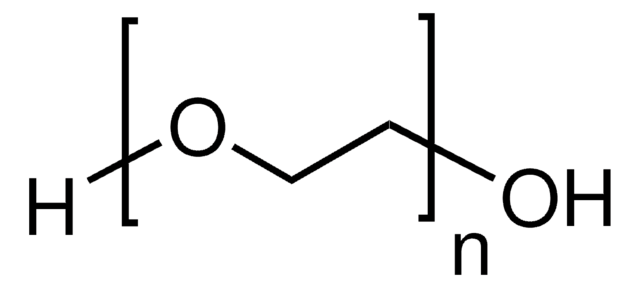528877
Polyethylene glycol
6000, Molecular Biology Grade
Synonym(s):
Poly(ethylene glycol), Polyethylene Glycol 6000, PEG
About This Item
Recommended Products
grade
Molecular Biology
Quality Level
form
solid
manufacturer/tradename
Calbiochem®
storage condition
OK to freeze
color
white
solubility
water: 200 mg/mL
cation traces
heavy metals (as Pb): ≤0.0005%
absorption
≤0.1 at 280 nm
≤0.2 at 260 nm
foreign activity
DNase, proteases, RNase, none detected
shipped in
ambient
storage temp.
15-25°C
SMILES string
C(CO)O
InChI
1S/C2H6O2/c3-1-2-4/h3-4H,1-2H2
InChI key
LYCAIKOWRPUZTN-UHFFFAOYSA-N
Looking for similar products? Visit Product Comparison Guide
Related Categories
General description
Application
- Challenges in Pharmacokinetic Modelling of [(18)F]fluoro-PEG-folate PET/CT Imaging in Epithelial Ovarian Cancer Patients.: This study addresses the complexities of pharmacokinetic modeling in using Polyethylene glycol (PEG)-conjugated imaging agents for PET/CT in ovarian cancer, highlighting the adaptability and clinical implications of PEG in diagnostic imaging (Ruytenberg et al., 2024).
- Assessing the toxicity of one-step-synthesized PEG-coated gold nanoparticles: in vitro and in vivo studies.: Research into the biocompatibility of PEG-coated gold nanoparticles synthesized in a single step, evaluating their safety profile across both cellular and animal models, thus underscoring PEG′s role in enhancing nanomedicine safety (Garrigós et al., 2024).
- Microwave synthesized novel biomass carbon dots applied in the fluorescent detection of crystal violet.: The study explores the use of PEG in the synthesis of carbon dots for enhanced fluorescence in dye detection, offering insights into the broader applicative potential of PEG in environmental monitoring and safety (Yin et al., 2024).
- Modified zero-valent iron nanoparticles enhanced remediation of PCBs-contaminated soil.: Illustrating PEG′s utility in environmental cleanup, this study details the enhancement of soil remediation techniques through the application of PEG-modified nanoparticles, reflecting PEG′s versatility across different sectors (Zhao et al., 2024).
Warning
Reconstitution
Legal Information
Storage Class
10 - Combustible liquids
wgk_germany
WGK 1
flash_point_f
281.5 °F - closed cup
flash_point_c
138.6 °C - closed cup
Certificates of Analysis (COA)
Search for Certificates of Analysis (COA) by entering the products Lot/Batch Number. Lot and Batch Numbers can be found on a product’s label following the words ‘Lot’ or ‘Batch’.
Already Own This Product?
Find documentation for the products that you have recently purchased in the Document Library.
Customers Also Viewed
Our team of scientists has experience in all areas of research including Life Science, Material Science, Chemical Synthesis, Chromatography, Analytical and many others.
Contact Technical Service